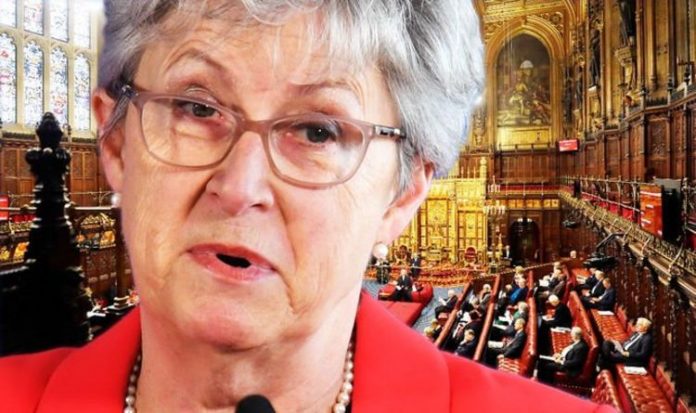Prime Minister Boris Johnson has appointed 36 new peers to the House of Lords, including several notable Brexit campaigners, two former Tory chancellors, supportive allies from his time in London City Hall, and his former editor. The list of peerages, granted by the Queen last Friday, did not come without criticism, though. Darren Hughes, chief executive of the Electoral Reform Society, which advocates abolition of the House of Lords, said: “By appointing a host of ex-MPs, party loyalists and his own brother, the Prime Minister is inviting total derision.
“That he can get away with it shows what a private member’s club this house is.”
The appointment of former Labour MP and Vote Leave chair Gisela Stuart, though, shows Mr Johnson might be planning wider reforms for the upper chamber.
The former Labour MP sits on the steering committee of the Constitution Reform Group, which backs the Act of Union Bill.
The Bill, which was said to be “on the desk” of Mr Johnson’s team in January, proposes a federal structure for the continuation of the Union, establishing the principle of self-determination among all four parts, as well as radical reforms in Westminster.
In an exclusive interview with Express.co.uk, Baroness Stuart, said: “The House of Lords is an institution that requires reform.
“And because it is a democratic system, the House of Lords itself will have a vote on what will happen to it.
“I am glad that I now have a vote in shaping the future of it.”
Regarding how the upper house could be reformed, she explained: “I think we have never had a proper national debate on two subjects.
JUST IN: Brussels’ damning plot for Italy in recovery fund row
“First of which is part of the Constitution Reform Group.
“One is: what do we think the House of Lords is for? Once we find that clearly, its composition flows from that.
“In the early Noughties, when the first laws to reform the House of Lords came in, there was no single political party with a majority,
“It became apolitical, revisal legislation. There was a real balance.
“Then, there was the coalition Government and you had a real influx of particularly Lib-Dem peers and the balance was changed. The Lords became more politicised and of course during the Brexit years, it almost became an alternative source of authority against the Commons.”
The second question, which we have never had a proper debate over, she added, is the rule of England and the representation of England, and the relationship with Scotland, Wales and Northern Ireland and how that affects the UK Government.
DON’T MISS:
China’s ‘fearsome threat’ picked apart by Cummings [INSIGHT]
EU’s status as trading force in doubt after halloumi row [REVEALED]
How German court struck EU blow and assisted even BETTER Brexit [ANALYSIS]
She added: “If you think the Lords should be a revising chamber, it needs to be much smaller.
“When you are appointed, you should keep your title for life, but there should be limits on terms. You get a kind of rotation.
“If on the other hand, you think we need something that reflects a semi-federal structure and the second chamber becomes representative of the regions or of the component nations that make up the UK.
“Do you appoint? Do you elect? What is the balance?
“These are the two debates that we need to have.”







